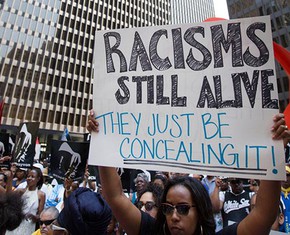The views expressed in our content reflect individual perspectives and do not represent the authoritative views of the Baha'i Faith.
Every age hath its own problem, and every soul its particular aspiration… Be anxiously concerned with the needs of the age ye live in, and center your deliberations on its exigencies and requirements. – Baha’u’llah, Gleanings from the Writings of Baha’u’llah, p. 213.
Baha’is don’t take part in partisan politics, but do concern themselves with the world’s pressing issues. Lately, some of the most serious and important global issues—sexual assault and the subjugation of women—have arisen as a result of the American presidential campaign.
In fact, one well-known pundit called the entire campaign a political battle over masculinity and its prerogatives. Because the presidential contest pits a woman against a man—or two women against two men, if you count the most prominent minor-party candidates—the United States has a choice, for the first time ever, to pick the gender of its leadership. After 227 years of exclusively male rule at the top, the country could possibly break precedent and choose a woman as its President.
While you might have initially thought that such an unprecedented male/female electoral choice would make for a more civil, polite, substantive campaign, it certainly hasn’t worked out that way. Both major-party candidates have leveled serious charges against one another that have to do with extramarital affairs, taking advantage of younger women, shaming victims and even sexually assaulting women. One candidate, taped while bragging about committing sexual assaults, then invited women who have accused the other candidate’s husband of extramarital affairs, and even rape, to attend a presidential debate. Charges and counter-charges have flown back and forth. Alleged victims have come forward, giving graphic descriptions of abuse. Unsavory, repellant and previously taboo language has entered the standard lexicon. The campaign, many people would agree, has coarsened public discourse exponentially.
These issues and the extensive media coverage they’ve generated have turned the campaign, and the world’s conversations about it, into down and dirty R-rated arguments. School teachers who usually ask their students to write essays about the American presidential race now have to weigh the wisdom of such assignments. Parents struggle with the question of how to explain the campaign and its controversies to their young children. Many people have come to see the ensuing campaign rhetoric as uncouth or disgusting at best, and absolutely shameful or even criminal at worst.
This has never happened before. So does this unprecedented conversation we’re now having reveal something completely new; or has this subject just managed to stay in the shadows until now, hidden and not spoken of in polite company or presidential campaigns?
In this series of essays, we’ll attempt to address those questions, and the very serious larger issues they raise: the status of women and girls in our societies; the prevalence of sexual predators among us; the normalization of such predation; and most importantly, what we can do to stop it.
But first, the Baha’i teachings clearly say that Baha’is should not involve themselves in partisan politics or take sides in such campaigns; so this series of essays will refuse to take any partisan positions, or even name the candidates involved. In fact, the following essays actually have nothing to do with purely political issues. Instead, these essays will take a hard look at the bigger, non-partisan gender-related questions the presidential campaign has managed to raise, examine this remarkable moment in the world’s history, and go far beyond politics to explore the important subjects of sexual assault, toxic masculinity and rape culture now in the forefront of the world’s consciousness.
So just to be clear, let’s look at the Baha’i teachings on these basic issues. All human beings have sexual impulses, so how do we deal with them and express them? Baha’u’llah urged men and women to “enter into wedlock,” and Baha’is believe that marriage provides the right environment for the expression of our natural sexual impulses. Like all of the great religions do, the Baha’i Faith emphasizes loving, faithful marriages and fidelity within those marriages—and warns us about exceeding those limits:
Enter ye into wedlock, that after you another may arise in your stead. We, verily, have forbidden you lechery, and not that which is conducive to fidelity. Have ye clung unto the promptings of your nature, and cast behind your backs the statutes of God? Fear ye God, and be not of the foolish. – Baha’u’llah, Epistle to the Son of the Wolf, p. 49.
Webster’s Dictionary defines a lecher as a “lewd, grossly sensual man;” and lechery as the “free or excessive indulgence of sexual desire.” If you’re not familiar with the term, ask any woman what a “lech” is—sadly, she can probably tell you from experience.
Societies all over the world have produced many lechers—where, as the old saying goes, “men are men, and women are afraid.” In countless surveys and polls, the majority of women and girls in multiple cultures say they have been the victims of lechery in its many psychological and physical forms: unwelcome sexual innuendo, leering, catcalls, insults, unwanted touching, harassment, groping, stalking, sexual assault and rape.
That pervasive, toxic mix of misogyny, sexism, objectification and violence against women, now called rape culture, defines a society where sexual predation and all of its attendant behaviors have become accepted and normalized. In these cultures, harmful societal attitudes about gender, sexuality, and the domination of women by men tend to prevail.
What can we do about that unacceptable state of society? Since we’re not likely to return to the old, outmoded cultural practices of separating men and women; and since most of the world’s more advanced societies now accept, at least in theory, the Baha’i principle of the equality of women and men; what course can we take to rid ourselves of rape culture? How can we assure the safety, dignity and personal autonomy of girls and women?
Let’s see if we can answer those questions in this series of essays—first, by considering the characters of men.
Next: Are Men Sexually Driven, Violent Beings by Nature?
You May Also Like
Comments

















is related to the well-discussed
"dumbing down" or "lowest denominator" trend of recent decades, I believe. I think that
started partly as a healthy reaction
to what a lot of folks saw as intell-
ectual snobbery irrelevant to the
"street". Celebrating the "low
down" then became a movement
that changed everything, from the
arts and entertainment, through
ways of dress, to even how ministers, journalists, and radio/
T. V. hosts act. It's clear by now
how far the pendulum has swung!
and self-indulgence in that area
involves the same moral laziness
and lack of shame as crude and
thoughtless discourse.
returned; luckily, it sounds less
vicious than other words, at least
if meant as it did in the 1950's and
earlier. David, this is very brave of
you to walk this tightrope now, but
very timely and important. As far as
the prevalence of coarse discourse
goes, I think we got here by stages:
over our lifetimes of some 70 years,
the boundaries of acceptability have
expanded with each generation,
setting a lower starting point from
which to descend every time. The
rebellious 1960's marked a major ...
fall, but not the only one: I'm sure
Watergate, the Viet Nam war, and
other specific events contributed to
the anger and demoralization that I
believe is behind the trend.
Oppositional sexism is also an issue. It the belief that one set of norms, behavior, etc exists for cisgnedered heterosexual, masculine men and another for cisgnedered heterosexual feminine women. All others are frowned upon and non-existent in oppositional sexism which is transgendered, genderqueer, genderfluid, non-binary, homosexual, bisexual, pansexual, tomboys, sissies, etc in that worldview. Note: sissies is a reclaimed word ...according to Wikipedia.